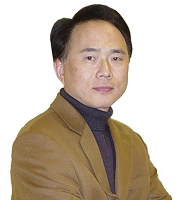所長室から

英国国際教育研究所 所長
London College of Education,
Graduate School(LCE-GS)学長
図師 照幸
知性とは繋がろうとする力である
‘Intelligence' can bring about togetherness
生物学的な〈ヒト〉という存在から社会的な存在としての〈人間〉に進化したとき、ヒトは自分以外の者の存在と自分の存在との関係の意味づけを迫られることになった。
自分と自分以外の者とが異なった存在であるということはまさに自明であるが、その異なった者が自分の存在と同じレベルで存在しているという論理を受容する力が成熟しないまま近代文明は一人歩きを続けてきた。そのことからくる不幸はいまや人類の存亡に関わる問題として表面化しつつある。
〈愛する〉ということは自分と異なった存在に対する深い理解であると定義できようが、時として異なったもののその異質性について理解しないばかりか、その異質性への攻撃が加えられたりもする。同化の強要である。
男と女、日本人とイギリス人、若者と老人、あなたと私、全ては異なった生を生きる存在である。その異なったもの同士が自分と相手との違いをできうる限り正確に把握し、理解し、その上で愛するというのが、いわゆる〈人間の関係〉でなければならない。
そして、その〈違い〉を正確に認識しようとする力をつけようとするのが〈教育〉であり、その結果得られた力を〈知性〉と呼ぶ。〈知性〉とはつまり、自分以外の人間と〈あたたかく繋がろうとする力〉である。
Ever since we evolved into human beings with an awareness of our social existence, we have been forced to define the relationship between ourselves and other people.
It is obvious that each of us has a different existence. Yet modern civilization has developed by diminishing our capacity to value each human being equally despite our differences. This has serious implications for mankind.
We can define love as a deep understanding of others who are different from ourselves. However, not only do we sometimes fail to understand and fully appreciate heterogeneity, we attack it. We force others to adopt our ways of thinking and behaving.
Men and women, British and Japanese, young and old, you and me. We all live different lives. We must try to grasp these differences as accurately as possible and learn to love them. This is the basis of human relationships.
Education nurtures our ability to distinguish and value differences, and this ability is what we call ‘intelligence’. Intelligence could thus be defined as an ability to relate with compassion to others.
